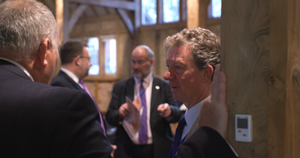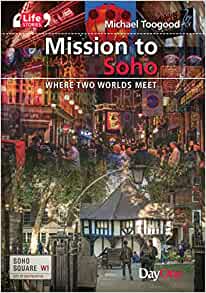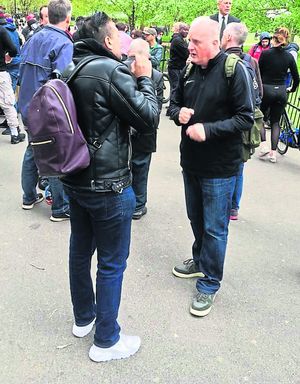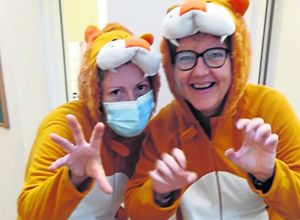The big interview
Radio DJ
ET continues its series of occasional interviews with Christians doing unusual things. Working in radio is a dream come true for Andy Westcott, 37, although the challenges he faces as a Christian on the ‘front line’ of secularism are very real.
The diner on Little Portland Street bears the hallmarks of the 1970s – wood on floor, walls and ceiling, and fish-finger sandwiches and ginger beer on the menu. The only differences are the enormous mixing deck to one side of the cash register and a hundred posters or flyers advertising new and little-known musicians. It’s a fitting spot for an interview with Q Radio presenter and producer Andy Westcott.
ET: How did you become a Christian?
AW: I cannot pinpoint a date on which I can say, ‘This is when I found the Lord’. I just never rejected the truths with which I was brought up; and I do remember that, when a call was made on a CYFA camp when I was 14 or 15, I thought it was disrespectful to make a big stand as I already believed that Jesus died for me personally. Of course, over the course of my life, there have been many landmark episodes in my journey of faith.
ET: What attracted you to radio?
AW: I blame my dad and my sister. They were both interested in it and this shaped my early knowledge of radio. I always thought it was something ‘too fun’ to end up doing as a job, however. In those days, careers advice was limited: if you weren’t going to be a doctor, then you were going to be a lawyer, teacher or banker. Now, schools present a breadth of opportunities. Back then, I thought radio was just a dream. And now I’m actually doing what I always wanted to do.
ET: Where did you get your first break?
AW: I started attending All Souls, Langham Place. Being part of a large church means that if you are looking for a left-handed fishmonger, it won’t be too long before you find one. So it was not long before I found someone who worked in commercial radio.
They put me in touch with someone at Premier Radio and I soon was working there voluntarily, taking calls from listeners. I once had an elderly lady ring in to say that she couldn’t get to church because she was stuck in the bath and listening to Premier instead!
ET: So how did you get to be doing what you do now?
AW: Well after Premier I worked at Saga and Virgin radio for about two years each, and then started working for Magic and Kerrang. It wasn’t long before Q came calling – when Q Radio became part of Kerrang. I was invited to produce Q Radio’s The Q Show, with Q Magazine’s editor, Paul Rees, where we play new music and review singles.
ET: It sounds like fun, but is this ‘the front line’?
AW: It’s not easy to be a Christian anywhere these days, but I’m not saying that every day I face a huge spiritual battle. The reality is that as Christians we are called to consume media thoughtfully and with discernment, whether it’s TV, radio or the newspapers.
There aren’t the in-your-face temptations that you might expect – the old cliché about the drugs and rock’n’roll lifestyle. It’s more insidious than that. You need to be careful as danger does not always dress as danger. Non-Christians with whom we work can be just as ‘moral’, but we need to stay alert and not slip quietly into their lifestyle, as they don’t share our faith; and we need to protect and to project that.
ET: Do you get a chance to protect and project your faith on-air?
AW: I’m fortunate to have a lot of control over the Q Show’s playlist and I have been known to schedule in contemporary music from credible Christian bands, such as Phil Campbell. It’s just another alternative music genre, and we try to cover them all.
I do try to be as mindful of Christian principles as I am of Ofcom guidelines that it’s my job to observe. For example, editing out my presenter’s blasphemy, especially as the show goes out on a Sunday afternoon.
What does frustrate me is that sometimes our guests mention their faith, but Paul (Rees) doesn’t pick up on that, because he’s not aware of the spiritual side. For example, we had Edwyn Collins, lead singer of 1980s band Orange Juice, who mentioned how his faith helped him after he suffered a stroke in 2005.
We’ve also interviewed comedian Tim Vine, who is a Christian – there are Christians in the entertainment industry – so there are opportunities to slip faith into a radio interview. I just wish Paul would be more aware of it.
ET: What Bible verse has been uppermost in your mind recently?
AW: I knew you’d ask me this. I’ll have Psalm 119:37 please: ‘Turn my eyes from looking at worthless things and give me life in your ways’.
Simoney Girard

















